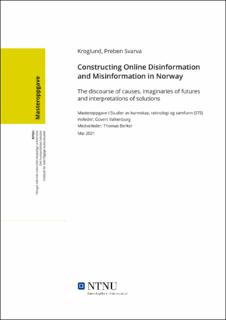| dc.contributor.advisor | Valkenburg, Govert | |
| dc.contributor.advisor | Berker, Thomas | |
| dc.contributor.author | Kroglund, Preben Svarva | |
| dc.date.accessioned | 2021-09-24T18:31:08Z | |
| dc.date.available | 2021-09-24T18:31:08Z | |
| dc.date.issued | 2021 | |
| dc.identifier | no.ntnu:inspera:78640361:47407859 | |
| dc.identifier.uri | https://hdl.handle.net/11250/2781829 | |
| dc.description.abstract | Problemet med desinformasjon og feilinformasjon på nett har fått oppmerksomhet i norske medier og samfunnsdebatten som følge av hendelser i utlandet. In denne oppgaven analyserer jeg norske aktørers konstruksjon av desinformasjon og feilinformasjon på nett i Norge. Jeg utforsker hvordan aktører konstruerer årsaker til, forestiller seg fremtider med og foreslår løsninger på problemet. Materialet som utforskes er funnet i tilgjengelige artikler, rapporter og nettsider. Diskursanalyse er brukt til å finne ut hvordan aktører konstruerer årsaker. Teorien om sosiotekniske forestillinger bidrar til å belyse normative bekymringer aktørene har. For å analysere aktørenes fleksible tolkninger for hvordan desinformasjon og feilinformasjon på nett i Norge, blir det teoretiske rammeverket for sosial konstruksjon av teknologi (SCOT) anvendt. Denne oppgaven finner at oppfatningen av sosiale årsaker primært dreier seg om politiske motiv, og i noe mindre grad økonomiske motiver, samt krisesituasjoner og følelser. De tekniske årsakene aktørene skylder på er internett og sosiale medier, samt tilhørende egenskaper som algoritmer, mangel på redaktør-filter og verktøy for å målrette budskap til spesifikke brukere. Aktørenes sosiotekniske forestillinger domineres av bekymring for tilliten i samfunnet, i form av sosial tillit, politisk tillit, tillit til medier og tillit til myndighetene. Enkelte aktører tror svekket tillit kan ramme demokratiet, mens andre frykter desinformasjon kan påvirke valg. For å løse problemet vil hermeneutiske løsninger oppfordre til og øke kritisk medieforståelse, informere offentligheten om problemet og tilrettelegge for sterke og uavhengige nyhetsmedier. Plattform-løsninger fungerer ved å moderere innhold og supplementere det med faktasjekker og troverdige kilder. Tillit fremtrer til slutt som en motpol til desinformasjon og feilinformasjon på nett i Norge ettersom det er den verdien som oppleves mest truet, den er nødvendig for at løsningene skal være effektive og den er en betingelse for å ivareta samfunnets motstandsdyktighet. Til slutt forklarer jeg hvordan problemet også representerer en autentisitets-skandale. | |
| dc.description.abstract | The problem of online disinformation and misinformation has gained attention in the Norwegian media and public debate following events abroad. In this thesis I analyze the construction of online disinformation and misinformation in Norway by actors in Norwegian society. I investigate how actors construct causes of, imagine futures with and propose solutions to the issue. The data for this investigation is sourced from available articles, reports and websites. Discourse analysis is used to reveal how actors construct causes. The theory of sociotechnical imaginaries assist in illuminating the normative concerns the actors have. To analyze the actors’ flexible interpretations for how to solve online disinformation and misinformation in Norway, the social construction of technology (SCOT) framework is applied. This thesis finds that the social causes perceived are primarily political motives, and to a lesser extent economic motives, the situation of crisis and emotions. The technical causes the actors blame are the internet and social media, as well as associated properties such as algorithms, lack of editorial filters and tools to target specific users. The sociotechnical imaginaries of the actors are dominated by a concern for trust in society, in the form of social trust, political trust, trust in news and trust in authorities. Some actors believe diminished trust could harm democracy, while others fear disinformation will influence elections. For solving the problem, hermeneutic solutions seek to encourage and raise critical media awareness, inform the public of the problem and maintain strong and independent news media. Platform solutions function to moderate content and supplement it with fact-checks and trustworthy sources. Trust emerges as a counterpoint to online disinformation and misinformation in Norway as it is the value perceived to be most threatened, it is required for solutions to be effective and it is a condition for sustaining society’s resilience. Finally, I explain how the problem also represents a scandal of authenticity. | |
| dc.language | eng | |
| dc.publisher | NTNU | |
| dc.title | Constructing Online Disinformation and Misinformation in Norway: The discourse of causes, imaginaries of futures and interpretations of solutions | |
| dc.type | Master thesis | |
